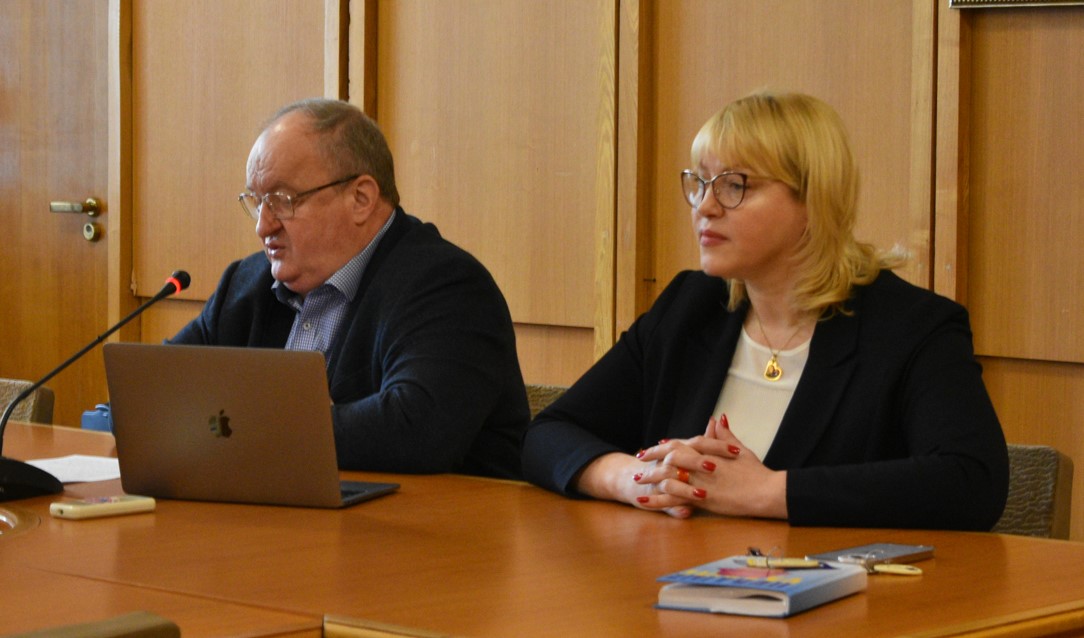ROUND TABLE “CRISES OF POLITICAL DEVELOPMENT IN UKRAINE AND THE RUSSIAN-UKRAINIAN WAR”

April 18, 2023 at the Kuras Institute of Political and Ethnic Studies of the National Academy of Sciences of Ukraine held a round table “Crises of political development in Ukraine and the Russian-Ukrainian war” and a presentation of the results of the scientific study “Crises of political development in Ukraine: causes, content and methods of leveling”. The research was conducted during 2020-2022 under the guidance of a corresponding member of the National Academy of Sciences of Ukraine, Doctor of Political Sciences, Professor, Head of the Department of Political Institutes and Processes of our Institute, Galyna Zelenko.
In his introductory speech, Oleg Rafalskiy, Director of the Institute, Vice-president of the National Academy of Sciences of Ukraine, Doctor of Historical Sciences, Professor, Corresponding Member of the National Academy of Sciences of Ukraine, Oleg Rafalskiy, emphasized the relevance of the main results of the study, which is aimed at studying the causes and features of political development crises in Ukraine, as well as finding ways to overcome them.

Oleg Rafalskiy, Galyna Zelenko
The scientific research was based on the analysis of crises of political development, including systemic, deep, long-term ones that arise due to institutional incoherence, legal vacuum, socio-cultural features of social development and existing political practices. Crises of political development, unlike political crises, have a systemic and long-term nature, are interconnected and often reinforce each other. In Ukraine, this creates a situation where the country seems to “go around in circles”, or it develops in leaps and bounds, unevenly, when a situation of “scissors” is formed between formal and real constitutionalism, etc.

Leonid Kiyanitsa, Oleh Kondratenko
The theoretical and methodological justification of the research was outlined in his presentation by the researcher of the Institute, Candidate of Political Sciences, Leonid Kiyanitsa. Galyna Zelenko characterized the crisis of identity as a crisis of political culture and political consciousness and its course in Ukraine. The reasons and features of the crisis of political legitimacy, as well as the challenges caused by the war and the tasks of post-war reconstruction, were presented in her report by a leading researcher, Candidate of Political Sciences Nataliya Kononenko.
Tetyana Lyashenko, a leading researcher, Doctor of Political Sciences, devoted her speech to the crisis of distribution as the state’s inability to effectively perform the function of distributing material goods and to build an appropriate institutional structure that would eliminate it.

Tetyana Lyashenko
The reasons for the penetration crisis, which is manifested in the insufficiency of reforms and the reasons for the low effectiveness of reforms, were outlined in her speech by chief researcher, Candidate of Political Sciences Svitlana Brekharya. The crisis of participation as a systemic problem based on, on the one hand, the paternalistic society, and on the other hand, the low efficiency of the existing channels of political participation, was highlighted in his speech by the leading researcher, Candidate of Political Sciences, Rostyslav Balaban. In the end, leading researcher, Doctor of Political Sciences Oleg Kondratenko characterized how the crises of political development affected the foreign policy of Ukraine and what decisions were converted into and why this has the effect of the current Russian military aggression.

Rostyslav Balaban, Galyna Zelenko
In the course of the research, the project executors discovered the causes and features of crisis phenomena, and also developed recommendations for overcoming these problems. These results, the participants of the round table emphasized, are important for understanding the situation in Ukraine, particularly in view of the full-scale Russian military invasion. Project participants drew attention to the importance of analyzing political crises in the context of democratic transition, denationalization of the economy, primary accumulation of capital and the nature of the political regime, and what is especially important – in the course of post-war recovery of Ukraine. Emphasis is placed on the need to consider crises of political development taking into account their systemic, deep and long-term nature.

Nataliya Kononenko
The director of the Institute of Sociology of the National Academy of Sciences of Ukraine, Doctor of Philosophy, Professor, Corresponding Member of the National Academy of Sciences of Ukraine Yevhen Golovakha, President of the Razumkov Center, Candidate of Political Sciences Yuriy Yakymenko, Head of the department of the National Institute of Strategic Studies Iryna Pavlenko, Head of the Department of Political Science of the Kyiv-Mohyla Academy, Doctor of Political Sciences Margarita Chabanna and others took part in the discussion of the research results.
In general, the results of the scientific project and, especially, the recommendations developed during its implementation, provide an understanding of the cause-and-effect relationships, advantages and disadvantages of the existing institutional system, institutional capacity (inability) of state authorities, which were especially evident during the full-scale Russian armed aggression, problems that Ukraine will face in the post-war period.
